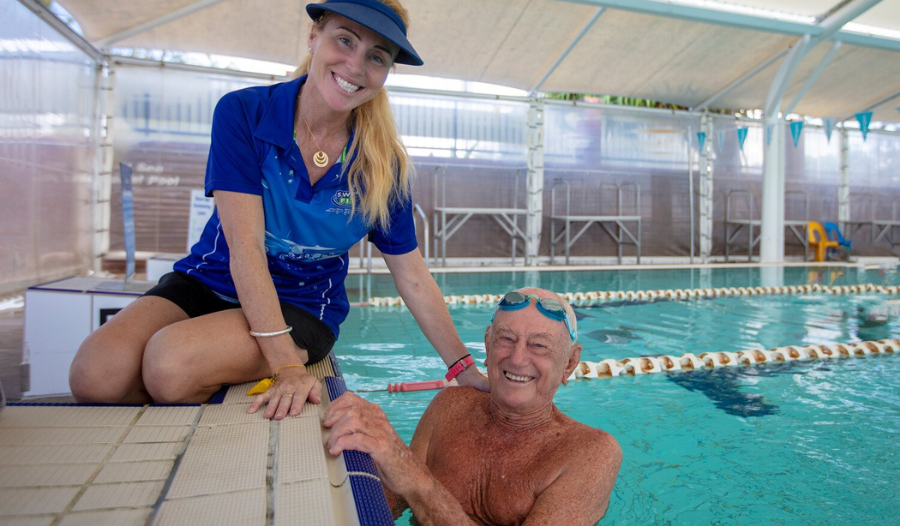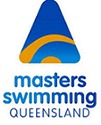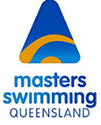
China Inspires
My name is Susie Maroney. Some time ago I met an active member of Masters Swimming Queensland when he was swimming laps in the Cotton Tree Olympic pool. I was, at the time, employed as a pool attendant patrolling the perimeters of the pools.
I had noticed a swimmer doing multiple laps and I had seen him many times before. He seemed to be training for a future event. When he completed his routine and was at the pool end, I just had to approach him and ask him just what he was training for. He said he was training for an upcoming Queensland State Championships.
His name was China Johnson, and he was a member of the Cotton Tree Masters Swimming Club. He asked me if I was a swimmer and I told him that I swam the English Channel at fifteen and swam mainly long distances for the next ten years. This casual meeting started a strange bond between us and over the next few months I managed to get quite an interesting story on his obsession with swimming.
When China was seventy-nine years of age, he noticed an entry in one of the country’s leading newspapers. It read as follows:
Olympic Spirit Returns to Oz. It is a case of goodbye Beijing, hello Sydney for Australians aged 35 years and over. The Sydney 2009 World Masters Games, the seventh edition of the world’s largest multi-sports event will run next year from October 10 to 18. One third of Australians aged 35 years and over have dreamt of competing at a major international sports event and their chance Is just around the corner. You don’t have to be a young elite athlete to have an Olympic style experience. The Sydney 2009 World Masters Games are open to mature age people of all abilities, so we are calling on Australians flush with Olympic spirit to get out there and have a go.
The article excited China. He hadn’t swum competitively for over forty years and never in a pool, as he was a surf swimmer as a youth. He thought if he could enter and get his name on a program, he would have something to show his grandchildren.
China thought it over for weeks. He consulted his local G.P. and had a complete medical examination. His doctor’s report was that he had slightly high blood pressure which could be controlled by 2 tablets a day, and he was slightly overweight but otherwise medically fit. The doctor said:
“China, have a go it’s a chance of a lifetime, you don’t have to win it’s the sport that counts, I envy you. Keep in touch, with the proper training you can compete, and I wish you well, my door is always open.”
China’s next move was to join a gym and he also joined his local Masters Swimming Club, the Maryborough Masters, which operated out of the Maryborough Olympic pool. China had twelve months to get into shape. His program for the next twelve months was a one-hour stint at the gym three days a week and a one-hour workout in the pool four times a week. If he felt that he could make it, he would only enter events no longer than 200 metres.
China travelled with the club to many district carnivals each weekend and finally entered his name for the Masters Swimming Queensland State Championships just to see if his routine was working. It was working O.K. as he came away with a silver medal in a freestyle event and two gold and a silver in backstroke. He now knew just where his best chances of success were.
A few months later, at the MSA National Championships, China came away with a few more medals, a bronze in freestyle, and two gold in backstroke. For the next three months, he concentrated only on freestyle and backstroke. He realized that he had no hope in the breaststroke or butterfly.
The day finally arrived when China approached the starting blocks for his first event at the Masters World Championships, the 100m backstroke. It was a fast event, and his inexperience was evident as he made a bad start but came home in third place. However, the second placegetter was disqualified for making an incorrect turn, which meant that he now gained a silver medal.
Day two saw him compete in the 100m freestyle and the 50m backstroke. He finished fourth in the freestyle but got another silver in the backstroke. Then the big event arrived on day three – the 200m backstroke, the event that he had trained hardest for. Luckily, China got a perfect start and led for the first three laps but was tiring, but held on just long enough to gain first place by a touch.
Some say that miracles do happen. Well they happened to China that day. He looked up at the score board high up on the wall and saw his name on top, he just put his head down and burst into tears, but they were tears of joy. It had taken him 80 years to achieve a result such as this.
When China returned home, he was living in Maryborough at the time, the Maryborough Masters club members were amazed. It was the first time that a member had ever competed on a world stage. They submitted his name to the Frazer Coast Council who were calling for nominations for sport persons of the year, and as a result China received a medal for being the senior sportsman of the year.
China thought that he had achieved his goal and would give the game away, but the club members convinced him to carry on. Well, he did just that and now 15 years later he is still swimming and winning medals at the age of 95. He used to hang his medals on a wall, but after a few years he ran out of wall space and now he keeps them in small buckets located below the television. They look marvellous – there are four of them with labels on the side to indicate what they each hold:
Bucket No 1 – World titles – 5 gold plus 5 silver
Bucket No 2 – Australian – 44 gold, 10 silver
Bucket No 3 – Queensland – 77 gold, 5 silver
Bucket No 4 – An assortment of local carnival medals
Alongside this display stands a milk crate that holds medals won at the Pan Pacific Masters Games. They were much too big to put in a bucket. There are 59 of them, 45 gold, 13 silver and one lonely bronze medal.
What I was wondering – Is there any competing swimmer in Masters Swimming Queensland or Australia with a better medal collection than this?
Incidentally, the hooks are still on the wall where China’s swimming medals once hung but are now filled with medals won by China competing in indoor rowing events. China is also a member of the local indoor rowing club and competes each year in the National and the Queensland State Championships with favourable results. His current medal tally totals 28 – 9 Australian and 19 Queensland medals and they are all gold.
Susie Maroney OAM

